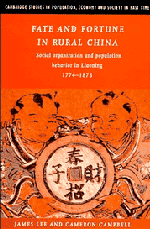Book contents
- Frontmatter
- Contents
- List of figures
- List of maps
- List of tables
- Acknowledgements
- PART 1 DAOYI VILLAGE
- PART 2 THE LIAONING DEMOGRAPHIC SYSTEM
- PART 3 HOUSEHOLD ORGANIZATION AND POPULATION BEHAVIOR
- 6 Domestic cycle and household formation
- 7 Domestic hierarchy and demographic privilege
- PART 4 BANNER ORGANIZATION AND POPULATION BEHAVIOR
- EPILOGUE: PROSPECTS, IMPLICATIONS, AND COMPARISONS
- Appendices
- Glossary
- References
- Index
- Cambridge Studies in Population, Economy and Society in Past Time
6 - Domestic cycle and household formation
Published online by Cambridge University Press: 20 October 2009
- Frontmatter
- Contents
- List of figures
- List of maps
- List of tables
- Acknowledgements
- PART 1 DAOYI VILLAGE
- PART 2 THE LIAONING DEMOGRAPHIC SYSTEM
- PART 3 HOUSEHOLD ORGANIZATION AND POPULATION BEHAVIOR
- 6 Domestic cycle and household formation
- 7 Domestic hierarchy and demographic privilege
- PART 4 BANNER ORGANIZATION AND POPULATION BEHAVIOR
- EPILOGUE: PROSPECTS, IMPLICATIONS, AND COMPARISONS
- Appendices
- Glossary
- References
- Index
- Cambridge Studies in Population, Economy and Society in Past Time
Summary
Big brother, though born of the same mother and living in the same house [as his brothers], his position was entirely different from theirs. In the large Gao household, he was the eldest son of an eldest son, and for that reason his destiny was fixed from the moment he came into the world.
(Ba Jin, Family, 35)In rural Liaoning, household structure, household position, and the rules of household formation combined to determine individual fate. Demographic decisions were decided by family strategy more than by personal preference. The family as a whole allocated labor and redistributed wealth; nurtured the young and cared for the aged. Family members who wanted to marry or bear children accordingly vied for a finite cache of rights and resources, distributed unequally by gender, by family relationship, and by seniority. The Liaoning peasant household was therefore not only a locus of affect and socialization, but also an arena of negotiation and conflict.
Household organization is a product of such negotiation. But just as these decisions can change household structure, so the arrangement of relationships within the household, in turn, influences individual opportunities and expectations to marry, to bear children, to retire, and to depart. Thus, each step along the household progression is the product of two reflexive forces: group strategy and individual will.
The domestic cycle reflects the common resolution of tensions within the domestic group. Rules of household formation show how people normatively resolved their competing claims. From them we can deduce the relationships between household members, and understand how authority was transmitted and transmuted within the household.
- Type
- Chapter
- Information
- Fate and Fortune in Rural ChinaSocial Organization and Population Behavior in Liaoning 1774–1873, pp. 105 - 132Publisher: Cambridge University PressPrint publication year: 1997



